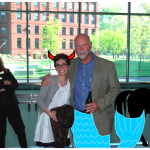Technology
WIFI Antenna Hack! - Amazing videos are here
more details
Have you ever bought a cell phone at one of those kiosks, or in a storefront for the carrier? Actually, if you are in the US I should ask "Have you ever NOT bought a cell phone in such a place?" (In at least some other countries they don't make the process so religious and obnoxious. You just go into Woolworth's or something and get your phone.)
Anyway, I'm looking forward to the prospect of getting my next cell phone at Amazon.com.
According to the site, the main objective is to make buying/upgrading/etc "easier."
The service appears to handle at least three carriers including Verizon (…
If you report, or just try to keep up to date, on research in this region, you know about RTI International. In 1958, it was the founding tenant of North Carolina's Research Triangle Park. Today it's one of the largest research institutes on the planet.
At 5:30 pm on Tuesday, June 8, RTI will welcome SCONC members to its 180-acre campus to learn about efforts to solve one of the world's most pressing challenges: the need to reengineer our energy use. Come and learn about efforts to create fuel from biomass, to remove sulfur and other bad actors from coal combustion and to use nanotechnology…
Last week I went to this season's last American Scientist pizza lunch at Sigma Xi featuring Phaedra Boinodiris (Twitter, blog), Serious Games Product Manager at IBM.
I first saw Phaedra Boinodiris speak as the opening speaker at TEDxRTP (my review) back in March, but this was a different kind of talk, geared more towards scientists and science communicators.
I remember playing Pong when it first came out. I remember spending many hours back in 1980 or so playing The Hobbit on Sinclair ZX Spectrum. And I played many games at arcades (still not knowing which games started out as arcade games…
Last week I went to this season's last American Scientist pizza lunch at Sigma Xi featuring Phaedra Boinodiris, Serious Games Product Manager at IBM, and I filed my report over on Science In The Triangle blog.
And what can you really do with them?
I am not an expert on consumer technology. I stay a few miles behind the cutting edge where I can pick up the orts at a discount, and most stuff works. Last time I checked, newer (faster, bigger, whatever-er) versions of technology cost more per unit (of speed, size, whatever) than would be predicted by examination of price/unit relationships for lower (and thus older) values. Some have incorrectly claimed this to be a logarithmic relationship, but clearly it is more often a linear relationship between cost and amount up to some point, then the prices…
Last night I went to the book reading of "On The Grid" by Scott Huler at Quail Ridge Books in Raleigh. It was a great event. I wrote a more detailed summary over on Science In The Triangle.
Check out this meta app. It runs fully functional in an iPad (I'm told), and is a super fancy reference library for the iPhone OS.
It is a web app that you can see on any web browser but, when it senses that it is on an iPad, shifts into super-duper mode.
Here's the links you need to pursue this technology:
The app on your web browser
Daring Fireball page
Dominion of the Bored page
WebMage is an interesting book if you are a computer geek. For one thing, the title of the book uses CamelCase. For another thing, the main characters are a hacker and his laptop. But since this is also a fantasy book, the main character is also a non-human (but you wouldn't' know to look at him) who is one of the best code hackers among his kind (which happens to include many of the Greek mythical figures you've heard of) and his laptop is a shape-shifting familiar, who changes between a laptop and an imp-like daemon thingie who is explicitly programmed to be snarky, like a modern human…
The reaction to the Venter Institute's synthetic genome transplantation has been decidedly mixed. Is this the beginning of something new and wonderful, the ability to really design organisms from scratch? Is it something more sinister, the beginning of a dark era where techno-corporate (or terrorist) interests can design something that will destroy the environment in catastrophic ways? Is it just a technical advance or a conceptual breakthrough? A philosophical revolution? Is it a Big Deal or big whoop? Synthetic biology has never been just one thing and still has many different goals, with a…
This list popped up on my screen this morning, and I thought it was an interesting window into a worldview. The article lists ten things that despite the economy, we aren't cutting back on:
Portable computers. The iPad might be the latest must-have gizmo, but the power of computers transcends trendiness. Brianna Karp, for instance, discovered lots of homeless people online, many logging in through their own laptops, like her. Shipments of notebooks have skyrocketed over the last three years, with sales in 2010 likely to be double what they were in 2007, according to the Consumer Electronics…
If you can, join us at noon, Tuesday, May 25, here in Research Triangle Park for our final 2009-2010 American Scientist pizza lunch talk. (Don't worry, we'll launch a new season next fall.)
Our speaker will be Phaedra Boinodiris, a Serious Games Program Manager at IBM, where she helps craft IBM's serious games strategy in technical training, marketing and leadership development. She'll discuss: "Using Games to develop strategies and skills to thrive in a real-time world." Boinodiris is the founder of the INNOV8 program, a series of games focused on business process management. An entrepreneur…
Straight from Neatorama:
A research team at Hebrew University in Israel has developed a computer program that can recognize sarcasm with about 77% accuracy:
To create such an algorithm, the team scanned 66,000 Amazon.com product reviews, with three different human annotators tagging sentences for sarcasm. The team then identified certain sarcastic patterns that emerged in the reviews and created a classification algorithm that puts each statement into a sarcastic class.
The algorithms were then trained on that seed set of 80 sentences from the collection of reviews. These annotated…
Perhaps the best 2010 TED talk - a must-watch:
This is one of the four TED videos we showed (according to the TED rules a TEDx has to show original TED videos as a certain percentage of the program) at TEDxRTP back in March:
When The Bride Of Coturnix posted this video on her Facebook Wall, she added this little note: "People often ask me what, exactly, Bora does for a living. This is the closest answer. The 'for a living' part is a bit of a gray area..." LOL
Important (h/t Bride Of Coturnix):
My first real visceral realization of the non-commutative nature of driving a car was the first time I tried to parallel park and attempted to pull front end first into the space.
Spinning off a blog at Inside Higher Ed, the Dean Dad has a post on deciding what classes are essential:
My personal sense of it is that the distinction between core and periphery is largely a function of purpose. If your goal in life is to be an exhibited artist, then you might well decide that art is essential and history a frill. If your goal is to be an engineer, I could understand valuing a math class over a psych class. Since different students have different purposes, I wouldn't be surprised to discover that one student's frill is another student's priority.
But the questions go deeper…
It is somewhat hard to grok how much a Big Deal the WWW2010 conference is when it's happening in one's own backyard. After all, all I had to do was drop the kids at school a little earlier each morning and drive down to Raleigh, through the familiar downtown streets, park in a familiar parking lot, and enter a familiar convention center, just to immediately bump into familiar people - the 'home team' of people I have been seeing at blogger meetups, tweetups and other events for years, like Paul Jones, Ruby Sinreich, Fred Stutzman, Ryan Boyles, Wayne Sutton, Kim Ashley, Henry Copeland and…


